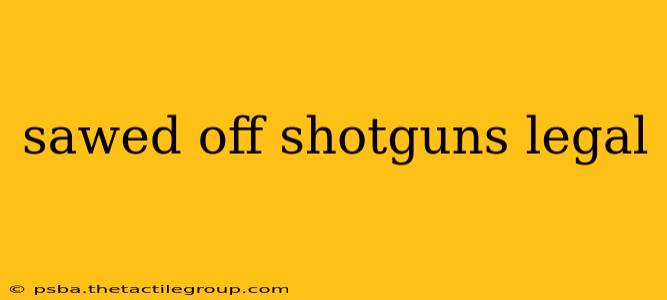Sawed-off shotguns hold a notorious reputation, often associated with crime and violence in popular culture. However, understanding the legal intricacies surrounding their ownership and possession is crucial for responsible gun owners and enthusiasts. This article delves into the complexities of sawed-off shotgun legality, highlighting the significant risks involved and emphasizing the importance of responsible gun ownership practices.
The Legal Landscape of Sawed-Off Shotguns
The legality of sawed-off shotguns, also known as short-barreled shotguns (SBS), is heavily regulated and varies significantly depending on jurisdiction. In the United States, the National Firearms Act (NFA) of 1934 strictly controls their manufacture, sale, transfer, and possession. This act defines an SBS as a shotgun with a barrel length of less than 18 inches or an overall length of less than 26 inches.
Key Legal Considerations:
- Federal Regulations: Under the NFA, owning an SBS requires a $200 tax stamp and registration with the Bureau of Alcohol, Tobacco, Firearms and Explosives (ATF). Failure to comply with these regulations can result in severe penalties, including substantial fines and imprisonment.
- State Laws: Individual states may have additional regulations concerning SBS ownership, potentially imposing stricter requirements than federal law. It's crucial to understand both federal and state laws before even considering the acquisition of an SBS.
- Background Checks: Thorough background checks are mandatory for anyone seeking to legally acquire an SBS, mirroring the stringent processes involved in obtaining other NFA-regulated firearms.
- Specific Exemptions: Certain exceptions may exist under specific circumstances, such as for law enforcement agencies or licensed collectors. However, these exemptions are highly regulated and require strict adherence to specific guidelines.
The Dangers of Sawed-Off Shotguns
Beyond the legal ramifications, the inherent dangers associated with sawed-off shotguns are considerable. Modifying a shotgun to shorten its barrel significantly alters its handling characteristics and increases the risks associated with its use.
Increased Recoil: Reducing the barrel length increases recoil, making the weapon harder to control and potentially causing injury to the shooter.
Reduced Accuracy: Shorter barrels lead to a decrease in accuracy, impacting the precision of shots and potentially increasing the likelihood of unintended consequences.
Increased Risk of Accidental Discharge: The increased recoil and reduced control can contribute to an increased risk of accidental discharge, posing a significant threat to the user and those in the vicinity.
Responsible Gun Ownership and the Law
Responsible gun ownership extends beyond mere compliance with legal requirements. It encompasses a deep understanding of firearm safety, proficiency in handling, and a commitment to storing firearms securely. Individuals considering ownership of any firearm, especially those regulated under the NFA, must prioritize extensive training and safety education.
Conclusion
The legal status of sawed-off shotguns is complex, demanding thorough understanding and adherence to both federal and state regulations. The inherent dangers associated with these weapons underscore the critical need for responsible gun ownership, prioritizing safety, proper training, and strict adherence to all applicable laws. Always consult with legal counsel and relevant authorities before attempting to acquire or possess any firearm regulated under the National Firearms Act. This information is for educational purposes only and does not constitute legal advice.

